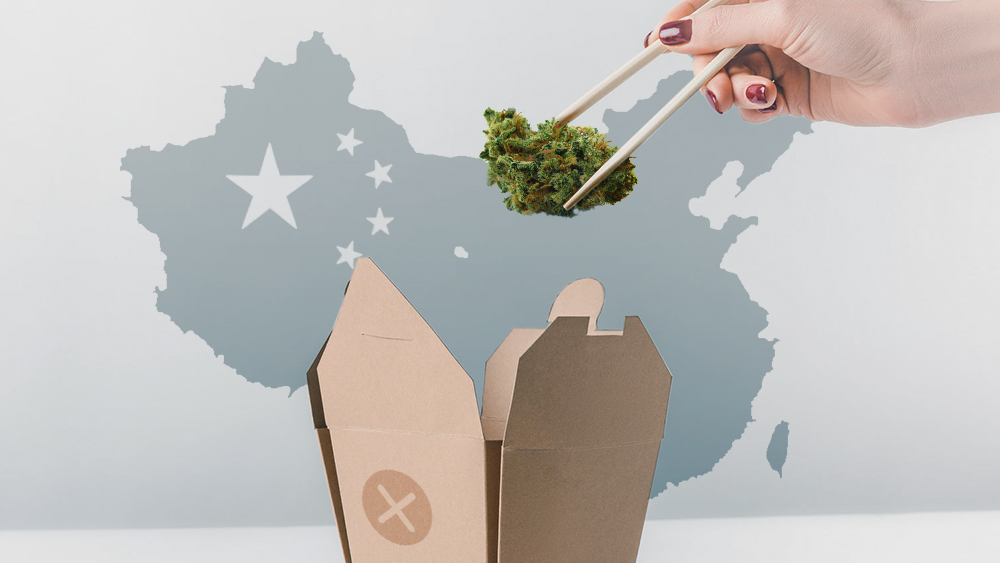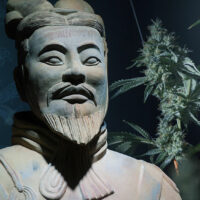Growing up part of the Chinese-Canadian community, the prevailing attitude my seniors had towards cannabis was always the same – it’s addictive, and it will ruin your life.
And now that we’re in a post-legalization Canada, Chinese-Canadians are still hesitant to challenge this perspective.
The Canadians who emigrated here from China grew up under a government with a vocal anti-cannabis stance, often condemning it as a dangerous influence from foreign cultures.
China cracks down
In July 2019, 19 foreign teachers and students in China were arrested after being tested positive for drug use in China’s eastern Jiangsu province, leading to a nationwide discussion on Chinese social media, with some calling for a crackdown on “unqualified” and “immoral” teachers from abroad.
This event followed a 2018 government announcement that it would double down on its anti-cannabis stance, issuing a public letter to Chinese citizens to avoid contact with cannabis in light of the recent wave of recreational and medical cannabis legalization spreading across Canada and within several U.S. states.
The government then went on to blame these countries for the recent spike in drugs being smuggled across their border, describing it as a “new threat to China.”
Liu Yuejin, the deputy director of the China National Narcotics Control Commission, said cannabis users in China increased more than 25 percent in 2018, intercepting 115 packages sent through international postal parcels containing 55 kilograms of cannabis and cannabis products.
One package recipient, a student, told China National Radio he became addicted to cannabis while living in Canada.
The Chinese media company Global Times said that some parents had begun calling for a “nationwide inspection” on the qualifications of foreign teachers.
Liu said most of the parcels they’d intercepted were connected to foreign students and Chinese nationals, who had returned from living abroad. An article on Foreignpolicy.com sums up Liu’s warnings to readers about the types of friends who “create a cannabis culture” of hedonism.
Foreign teachers and students weren’t the only ones hit by government raids, according to that same article. Several foreign-owned restaurants, cafés, and bars had to shut down after their owners were visited in their homes by officers in the middle of the night, demanding drug tests and deporting anyone from the country who failed to pass them.
Possession, sale, and cultivation of THC cannabis are strictly prohibited in China, with the maximum penalty for growing up to 3,000 cannabis plants of five years in jail. Under Chinese criminal law, being found with even a small amount can lead to being detained for up to 15 days. Anyone with more than 5 kilograms of processed marijuana leaves can face the death penalty.
Ancient China’s secret cannabis history
China didn’t always have such a strong anti-cannabis stance. In fact, for thousands of years, it was widely known as one of the world’s largest producers. Some of the earliest archeological evidence of hemp usage dates back to China in 10,000 B.C.
The historical evidence points to the plant being used in China for rope, clothing, bowstrings, and medicine. It’s also thought to have been used in the earliest forms of Chinese paper.
The ancient emperor Sheng-Nung, also known as the father of Chinese Medicine, listed the cannabis plant in his medical encyclopedia. He used it to treat menstruation, constipation, and absentmindedness. In the second century A.D., Chinese surgeon Hua T’o began combining cannabis resin with wine to reduce pain during surgery.
In 1985, the government signed the United Nations Convention of Psychotropic substances, leading to the ban of all hemp cultivation.
However, as it was important for producing rope and textiles, the government began regulating hemp production in Yunnan in 2003, and largely ignored its illegal production in other provinces.
In 2014, the Ministry of Public Security found an abundance of unregistered hemp plantations in the provinces of Jilin and Inner Mongolia.
Many cannabis farms were also found to belong to remote farmers in the province of XinJiang, home of the Muslim Uyghurs, an ethnic minority whose treatment by the Chinese government has been the focus of recent international media scrutiny.
But in recent years, the government had a change of heart, legalizing and regulating the country’s vast and previously largely unregulated hemp production. Hemp seeds and oil, and the use of CBD in cosmetics, are all now permitted.
According to the National Bureau of Statistics, the Chinese hemp industry currently accounts for about half the world’s legal hemp cannabis cropland.
Despite this, the government holds steadfast on its hardline position against recreational cannabis. This stance is reflected in the stigma that many Chinese nationals have towards the drug.
The beginning of China’s cannabis stigma
“I feel very angry and very shocked,” world-famous actor Jacky Chan wrote in response to the detention of his son, Jaycee Chen, who tested positive for marijuana use in 2014.
As an official narcotics Control Ambassador for the Chinese Police, Jackie Chan said that “as a public figure, I’m very ashamed. As a father, I’m heartbroken.”
Chan voiced his support of the use of the death penalty for some drug offenders, saying that they were hurting “thousands and thousands of young children.”
He added that he doesn’t agree with the many young people, who “think it’s just like a cigarette.”
“I say it’s not okay, not in my family,” said Chan.
Chan’s reaction to this event reflects the stigma that many people of his generation in China have towards recreational cannabis drug use, especially within their own families.
When a Chinese-Canadian friend of mine tried to get their parent’s opinions on legalization, their opposition to it was clear.
They couldn’t believe the government was going to allow its citizens to open access such a harmful and addictive substance.
When she pressed them further about their opinion, she realized that they had been confusing cannabis with crack cocaine.
This is a misconception that I’ve found is held by many members of the senior Chinese community.
To understand how this ignorance, and general attitude towards the drug, became so prevalent, you must look back to the mid-1800s, a period known in the country as the “Century of Humiliation.”
The Opium War: Sparking one hundred years of loss and shame
In the early 19th century, tea, porcelain, and silk were in high demand in Great Britain. Luckily for China, who had an abundance of all these products, this resulted in a trade imbalance that left Great Britain struggling to find a way to tip the scales in their favor.
British traders found their solution in opium. They began supplying the illegal and addictive substance to China, where its use had become rampant. Estimates show that opium had up to 12 million users during this period.
By the 1830s, opium was China’s largest foreign imported product. This tilted the trade imbalance over into Britain’s favor.
China, whose trade routes were exclusively bottlenecked through the province of Canton, decided to imprison the British opium merchants until they agreed to give up their entire season’s supply of opium.
This conflict resulted in the beginning of the Opium War, which China eventually lost. They were forced to cede control of some of their land to the British, most notably, Hong Kong island. This was the beginning of what is known as the Century of Humiliation.
Two decades later during the Second Opium War, China faced-off and lost against the French, the British, and the Americans. This ended in the destruction of the Chinese Summer Palace – known by some as “China’s Ground Zero.”
To this day, the Chinese government encourages its citizens to visit this area to be reminded of the dangers posed by foreign invasion.
China continued to face defeat at the hands of Germany, Japan, and Russia, all of whom were looking for their share of China’s vast empire. China lost over one-third of its territory, and tens of millions of citizens.
This grim 104 year-period of Chinese history wouldn’t end until China emerged victorious as one of the four allied nations to win World War II.
Subsequent Chinese governments decided to focus on modernization and industrialization in order to keep that situation from ever happening again.
It also marked the beginning of their harsh anti-narcotic policies. These stringent laws are harshly enforced, with 470 executions in 2008 related to drug charges.
The tables turn as a new trade imbalance emerges
“When I hear about marijuana legalization, I think of the opium war,” Doris Siu, a Chinese-Canadian told the South China Morning Post. “I know there’s a difference, but this war made society unproductive and people lost everything and China went into a huge economic decline.”
No matter how widely accepted this drug becomes across Canada and beyond, I don’t imagine I will be lighting up in China any time soon. However, this doesn’t mean their government isn’t looking into the plant’s commercial potential.
According to the World Intellectual Property Organization, Chinese firms have filed 309 of the world’s 606 cannabis patents. CBD and hemp producers across China are setting their sights on overseas markets.
Prohibition Partners, a cannabis consulting firm, published a report saying that China’s hemp market would be worth US$1.6 billion in 2018.
Hemp Investment Group, a Beijing based company advocating for commercial cannabis use, has partnered with the People’s Liberation Army to export their products internationally, including a drug to treat post-traumatic stress disorder. The company’s president, Tan Xin, believes the sector will grow into a 100 billion yuan (US$14 billion) industry within 5 years.
This estimate runs short of the US$15 billion estimate by 2024 from Jamie Gibson of Regent Pacific Group, the chief executive of Hong Kong-based investment company Regent Pacific Group.
Regardless of whether the market reaches these lofty predictions, one thing is certain: China is determined to create a trade imbalance once again in their favor.
Just don’t expect them to grow your weed and smoke it too.








eden cartar January 26, 2020 at 2:57 pm
WeChat.. Bud-Merchants if you need weed in China.
Mya October 28, 2020 at 5:54 am
Awesome article! Thanks!
William February 6, 2021 at 2:37 pm
Adam Chen is right to point out a marijuana legalization trend in White People’s world. Does he also see a trend of Chinese people rising up rapidly and White people falling down sharply?